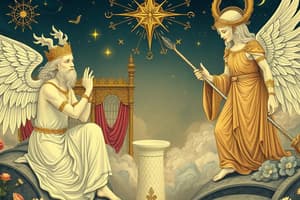Podcast
Questions and Answers
What does it mean that God created the universe 'ex nihilo'?
What does it mean that God created the universe 'ex nihilo'?
- The universe was created from pre-existing materials.
- The universe was created in stages throughout history.
- The universe evolved over time from simpler forms.
- The universe came into existence out of nothing. (correct)
What is the ultimate end of man according to the belief system presented?
What is the ultimate end of man according to the belief system presented?
- To avoid suffering and enjoy life.
- To attain a better understanding of the universe.
- To return to God and participate in the Good. (correct)
- To achieve personal success and happiness.
How is conscience defined in the context provided?
How is conscience defined in the context provided?
- The specific judgment made in a particular situation regarding moral action. (correct)
- The basic instinctual motivator for human actions.
- A philosophical framework for understanding ethics.
- A universal moral compass shared by all humans.
What role does synderesis play in moral decision-making?
What role does synderesis play in moral decision-making?
According to the content, what is the moral law?
According to the content, what is the moral law?
Why do suffering and death exist, according to the beliefs expressed?
Why do suffering and death exist, according to the beliefs expressed?
What does it imply that creatures have a real relation to God?
What does it imply that creatures have a real relation to God?
What is the significance of man being created in the image and likeness of God?
What is the significance of man being created in the image and likeness of God?
What is the reason God created the universe, according to the content provided?
What is the reason God created the universe, according to the content provided?
What does the existence of suffering and death signify in the belief system described?
What does the existence of suffering and death signify in the belief system described?
How is the relationship between God and his creatures characterized?
How is the relationship between God and his creatures characterized?
In the moral framework discussed, how is the action defined as good?
In the moral framework discussed, how is the action defined as good?
What is the role of conscience in moral decision-making as outlined in the content?
What is the role of conscience in moral decision-making as outlined in the content?
What does synderesis represent in the context of morality?
What does synderesis represent in the context of morality?
Why should man follow his nature as good, according to the content provided?
Why should man follow his nature as good, according to the content provided?
What is implied by the phrase 'doing evil is against the real nature of man'?
What is implied by the phrase 'doing evil is against the real nature of man'?
Flashcards are hidden until you start studying
Study Notes
The Nature of the Universe
- The universe encompasses both corruptible elements (happiness, pain) and incorruptible elements (life, death).
- Suffering and death arise from the limitations of creatures with varying degrees of goodness, not from divine will.
- God's goodness is the reason for creating the universe; regardless of the world's nature, it reflects divine goodness.
- The universe was created 'ex nihilo,' meaning "out of nothing," emphasizing its instantaneous existence.
God's Relationship with Creation
- God is characterized as a necessary being, unchanging and independent.
- Creatures, as contingent beings, rely on God's creative act for their existence, establishing a real relationship despite God's transcendence.
Human Existence and Purpose
- God is both the source and ultimate goal of human existence, embodying the highest goodness (Summum Bonum).
- Human beings participate in God's goodness and are inherently good, reflecting the divine image.
Understanding of Conscience and Synderesis
- Conscience is the specific judgment that guides moral decision-making in particular situations.
- Synderesis is an intellectual disposition that provides fundamental moral principles, urging individuals to do good and avoid evil.
- Synderesis serves as an innate moral compass, directing humans towards good actions while restraining from evil.
The Moral Law
- Man’s moral law dictates that good actions align with reason, while bad actions oppose it.
- The pursuit of good deeds is essential for fulfilling one's purpose and aligning with human nature.
- Engaging in evil contradicts the true essence of humanity; genuine existence involves performing good actions.
Role of Conscience in Morality
- Conscience acts as a natural guide for moral decisions, indicating when one's actions are good.
- A failure to align with conscience leads to feelings of guilt, self-reproach, or remorse.
- Morality transcends arbitrary behavioral rules; it is grounded in human nature, which serves as the primary norm for moral obligations.
The Nature of the Universe
- The universe encompasses both corruptible elements (happiness, pain) and incorruptible elements (life, death).
- Suffering and death arise from the limitations of creatures with varying degrees of goodness, not from divine will.
- God's goodness is the reason for creating the universe; regardless of the world's nature, it reflects divine goodness.
- The universe was created 'ex nihilo,' meaning "out of nothing," emphasizing its instantaneous existence.
God's Relationship with Creation
- God is characterized as a necessary being, unchanging and independent.
- Creatures, as contingent beings, rely on God's creative act for their existence, establishing a real relationship despite God's transcendence.
Human Existence and Purpose
- God is both the source and ultimate goal of human existence, embodying the highest goodness (Summum Bonum).
- Human beings participate in God's goodness and are inherently good, reflecting the divine image.
Understanding of Conscience and Synderesis
- Conscience is the specific judgment that guides moral decision-making in particular situations.
- Synderesis is an intellectual disposition that provides fundamental moral principles, urging individuals to do good and avoid evil.
- Synderesis serves as an innate moral compass, directing humans towards good actions while restraining from evil.
The Moral Law
- Man’s moral law dictates that good actions align with reason, while bad actions oppose it.
- The pursuit of good deeds is essential for fulfilling one's purpose and aligning with human nature.
- Engaging in evil contradicts the true essence of humanity; genuine existence involves performing good actions.
Role of Conscience in Morality
- Conscience acts as a natural guide for moral decisions, indicating when one's actions are good.
- A failure to align with conscience leads to feelings of guilt, self-reproach, or remorse.
- Morality transcends arbitrary behavioral rules; it is grounded in human nature, which serves as the primary norm for moral obligations.
Studying That Suits You
Use AI to generate personalized quizzes and flashcards to suit your learning preferences.




